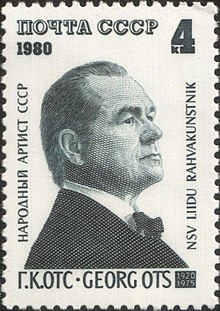Georg Ots
| Georg Ots | |
|---|---|

Georg Ots on the Soviet post stamp dated 1980
|
|
| Born |
March 21, 1920 Petrograd, Russian Soviet Federative Socialist Republic |
| Died | September 5, 1975 (aged 55) Tallinn, Estonia |
| Occupation | Singer |
| Years active | 1944-1975 |
| Spouse(s) | Margot Laane (m. 1941 - d. 1941) Asta Saar (m. 1944 - d. 1964) Ilona Noor (m. 1964 until his death in 1975) |
Georg Ots (21 March 1920 in Petrograd – 5 September 1975 in Tallinn, Estonia) was an Estonian singer.
Before studying singing with the Estonian baritone Aleksander Arder in Yaroslavl in the rear of the Eastern Front, where a cultural centre for evacuated Estonians had been established, Ots was a young Navy Officer who had escaped a sinking ship and was taken prisoner in Russia. He was released a year later, and on his return home he auditioned for a place at the conservatory in Tallinn. At the same time, he became a member of the chorus at the Estonia Theatre in Tallinn. His solo opera debut was a tiny part in Eugene Onegin (1944). He soon became one of the most revered singers in Estonia and Finland, and was also admired and loved all over Russia.
Ots often performed in many major opera houses of the former Soviet Union, being especially cherished at the Bolshoi Theatre in Moscow. His repertoire included the roles of: Eugene Onegin, Yeletzky, Escamillo, Renato,Don Giovanni, Papageno, Rigoletto, Iago, Porgy, Figaro, and the title role in Kabalevsky's Colas Breugnon. Ots sang in Estonian, Russian, Finnish, German, Italian and French, and was fluent in all six languages. Ots's most famous role, with which he is often identified with, was the leading character in Anton Rubinstein's opera The Demon. The libretto of The Demon is based on Mikhail Lermontov's famous epic poem, once banned because of its plot line which involves a misalliance between a dark angel and a Georgian princess. Georg Ots's interpretation of the angel mesmerised audiences and received rapturous reviews, making Lermontov's controversial poem even more famous.
...
Wikipedia
